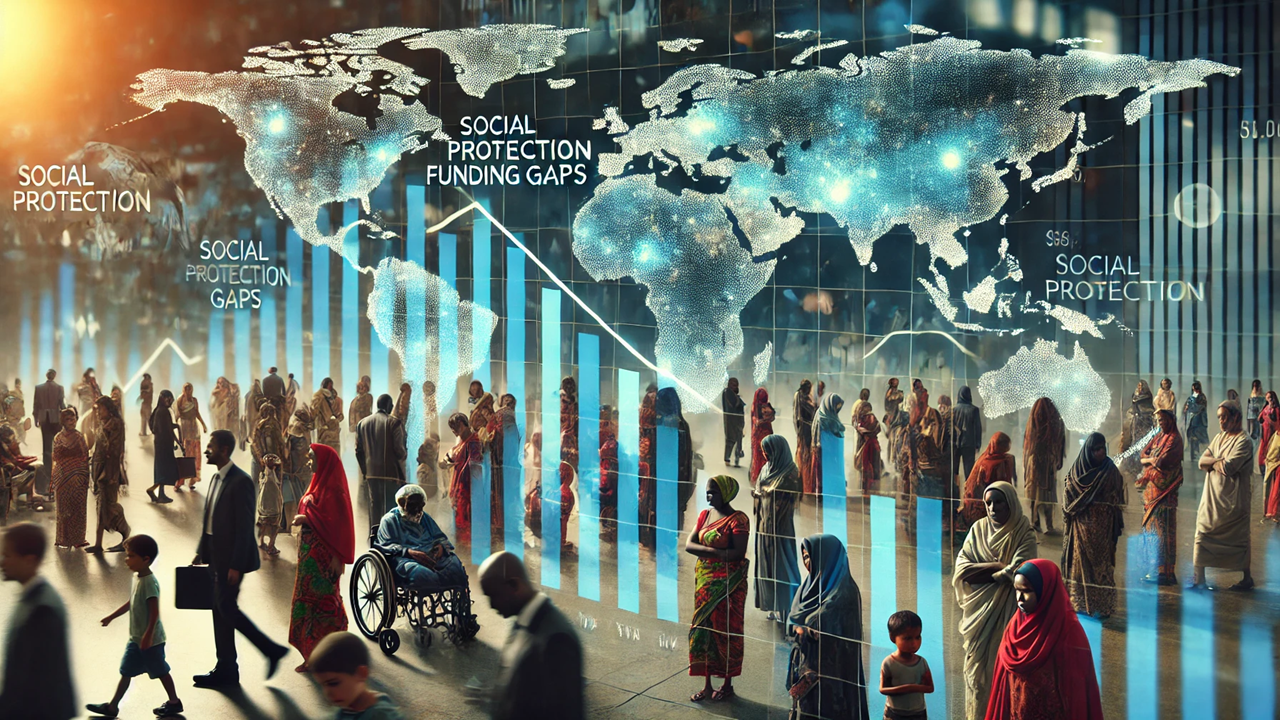Bridging the Social Protection Gap: A Global Call to Action
This article explores the financing gap to achieve universal social protection, based on the ILO’s 2024 report. The report reveals that low- and middle-income countries face a significant shortfall, with low-income nations needing to allocate up to 52.3% of their GDP. It calls for a global effort to address this challenge, with strategies such as progressive taxation, international climate financing, combatting illicit financial flows, and increasing official development assistance.

Achieving universal social protection remains one of the most pressing global challenges. A recent report titled "Financing Gap for Universal Social Protection: Global, Regional, and National Estimates and Strategies for Creating Fiscal Space", published by the International Labour Organization (ILO) in April 2024, sheds light on the financial obstacles faced by low- and middle-income countries in providing comprehensive social protection. The report’s findings highlight the need for innovative strategies to create fiscal space and ensure that vulnerable populations are not left behind.
The Global Social Protection Shortfall
The report covers 133 low- and middle-income countries, calculating that closing the gap in social protection floors would require an additional 3.3 percent of global GDP annually. The financial burden, however, is disproportionately heavy for low-income nations, where the social protection financing gap surges to an overwhelming 52.3 percent of GDP. This shortfall includes essential healthcare, as well as five key social security guarantees: income support for children, persons with severe disabilities, mothers of newborns, older persons, and the unemployed.
To put these numbers in perspective, achieving universal social protection would require low-income countries to mobilize four times their current annual government expenditure. For middle-income countries, the gap equates to 10.6 percent of their annual government spending, underscoring the magnitude of the challenge across the development spectrum.
Regional Disparities and Gender Gaps
While the global average financing gap is 3.3 percent of GDP, significant regional differences are revealed in the report. Africa faces the most substantial challenge, requiring 17.6 percent of its GDP to close the gap, particularly in countries like Sudan, where the gap is a staggering 380 percent of GDP. Low- and middle-income countries in the Arab States also face high deficits, requiring 11.4 percent of GDP to bridge the gap, followed by Latin America, the Caribbean, and Asia-Pacific, where gaps are more modest but still significant.
One key area of concern is gender inequality in old-age benefits. Across all regions, two-thirds of the resources needed to close the old-age pension gap are required for women. Women’s lower participation in formal employment and the prevalence of informal work have created wide disparities in pension coverage. In upper-middle-income countries, for example, 71 percent of the financing gap for old-age pensions is allocated to closing the gender gap.
Strategies for Fiscal Space
To address this global shortfall, the report outlines several innovative strategies that countries can adopt to create fiscal space for social protection.
Increasing Tax Revenues: The introduction of progressive taxation on wealth, income, and corporate profits, combined with the elimination of fossil fuel subsidies, can provide a sustainable source of revenue. The report stresses the need for governments to re-examine tax concessions to corporations, which often result in significant revenue losses.
International Climate Financing: The report encourages leveraging international climate financing mechanisms to fund social protection, especially in low-income countries that are most vulnerable to the effects of climate change. By linking social protection systems with climate adaptation efforts, countries can address both economic and environmental vulnerabilities.
Combatting Illicit Financial Flows: Illicit financial flows, such as money laundering, tax evasion, and trade mispricing, drain much-needed resources from developing countries. Reducing these flows could free up substantial funds that could be directed towards social protection. For example, it is estimated that eliminating illicit financial outflows in Egypt could generate an amount equivalent to 3 percent of the country’s GDP annually.
Managing Sovereign Debt: Debt management plays a crucial role in creating fiscal space. Renegotiating debt with lower interest rates could free up government resources, allowing more funds to be allocated toward social protection. However, the report is clear that sovereign debt should not be seen as a permanent solution, and international solidarity is essential for countries with significant financing gaps.
Boosting International Aid: In many low-income countries, domestic resources alone are insufficient to bridge the gap. The report calls for increased official development assistance (ODA), which would need to be more than tripled and fully allocated to social protection in the poorest countries.
A Call for Global Solidarity
The ILO report makes it clear that domestic efforts alone will not be enough to close the social protection gap, particularly in the poorest countries. It calls for global solidarity, emphasizing that the international community has a shared responsibility to ensure that no one is left behind.
Universal social protection is not just a moral imperative but a crucial policy tool for fostering economic resilience and addressing global inequalities. Without it, the most vulnerable populations, especially in low-income countries, will continue to face heightened risks in times of economic and social crises.
The report serves as a wake-up call for policymakers and international stakeholders to take coordinated action. As the world strives to meet the targets of the Sustainable Development Goals (SDGs), universal social protection will play a pivotal role in achieving sustainable, inclusive development for all.
- FIRST PUBLISHED IN:
- Devdiscourse
ALSO READ
ILO and Norway Strengthen Partnership to Advance Global Skills Development and Inclusion
ILO Chief Gilbert Houngbo Advocates Social Justice and Decent Work During Visit to Zimbabwe
Pilots strike at South African Airways ends, broadcaster eNCA reports
ILO Workshop Champions Gender Equality in Egypt's Green Economy Transition
India's Aviation Boom: A New Horizon for Aspiring Pilots










